
What Coding Language Should I Learn for Cyber Security?
As cyber threats become more sophisticated, the ability to write and understand code has become an essential part of a cybersecurity expert’s toolkit.
Whether you’re a beginner or an experienced professional, knowing the right programming languages can help you excel in your career.
In this article, we’ll answer a question most cybersecurity professionals ask: what coding language should I learn for cyber security based on my career goals, the best programming languages for cybersecurity in 2025, and how these skills can enhance your effectiveness in safeguarding digital systems.
From cybersecurity coding examples to insights on salaries, we’ll cover everything you need to know to make an informed decision about learning programming for cybersecurity.

RELATED: How to Become a GRC Analyst?
What Coding Language Should I Learn for Cyber Security? Summary Table
| Programming Language | Why It’s Important | Use Cases | Best For | Learning Resources |
| Python | Versatile, beginner-friendly, widely used for automation and scripting. | Network scanning, penetration testing, malware analysis. | Beginners, Penetration Testers, Analysts | Codecademy, LearnPython.org, Automate the Boring Stuff. |
| JavaScript | Key for web security, addressing client-side vulnerabilities. | Preventing XSS, securing web apps, analyzing browser-based threats. | Web Security Analysts | W3Schools, MDN Web Docs. |
| SQL | Essential for securing databases and defending against injection attacks. | Database security, injection prevention, forensic analysis. | Database Security Specialists | SQLZoo, DataCamp, W3Schools. |
| C and C++ | Provides low-level access, useful for exploit development and secure software. | Malware analysis, debugging vulnerabilities, secure system design. | Malware Analysts, Secure System Developers | GeeksforGeeks, HackerRank. |
| Bash/PowerShell | Automates tasks and manages system configurations on Linux/Windows. | Incident response, log parsing, system hardening. | System Administrators, Incident Responders | Linux Academy, PowerShell.org. |
| Java | Ideal for secure enterprise and mobile application development. | Securing enterprise apps, building secure server-side systems. | Enterprise Security Engineers | Codecademy, Oracle Java Tutorials. |
| PHP | Common in server-side web applications; understanding prevents vulnerabilities. | Securing websites, analyzing PHP-based vulnerabilities. | Web Application Security Specialists | PHP.net, XAMPP, WordPress development tutorials. |
| Ruby | Simplifies penetration testing tool development, used in frameworks like Metasploit. | Automating security workflows, creating custom tools. | Penetration Testers | RubyMonk, Metasploit Tutorials. |
| Assembly | Low-level language for understanding malware and system architecture. | Reverse engineering malware, writing shellcode. | Reverse Engineers, Malware Analysts | Ghidra, Programming from the Ground Up. |
READ MORE: How to Start a Cybersecurity Firm
Do I Need to Learn Programming for Cyber Security?
The simple answer is: not always, but it depends on the role you aim to pursue in cybersecurity. While some positions focus on managing tools and frameworks, others require a deep understanding of code to analyze vulnerabilities, create security solutions, and automate processes. Let’s break it down:
When Programming Skills Are Essential
Roles such as penetration testers, malware analysts, and security engineers rely heavily on programming. For instance:
- Penetration testers often write custom exploits to uncover vulnerabilities.
- Malware analysts reverse-engineer malicious software, requiring knowledge of low-level programming languages like Assembly or C.
- Security engineers build secure systems, requiring languages like Python or Java for automation and development.
When Programming Is Not Mandatory
Some roles, like compliance analysts or governance professionals, do not involve direct programming. Instead, these positions focus on risk management, audits, and implementing policies.
How Programming Enhances Cybersecurity Careers
Even in roles where coding isn’t mandatory, it provides a significant edge by:
- Allowing professionals to automate repetitive tasks, like log analysis or system configuration.
- Enabling deeper insights into the tools and technologies used in the field.
- Improving problem-solving by understanding how attackers exploit systems.
Key Cyber Security Coding Examples
Imagine you’re tasked with automating network scanning. A Python script can save hours by quickly identifying vulnerabilities, a task impossible without coding skills. Or consider analyzing SQL injection attacks – knowledge of SQL is invaluable for detecting and resolving database vulnerabilities.
Programming, while not universally required, is a valuable skill that opens doors to advanced cybersecurity roles.
Best Programming Languages for Cyber Security 2025
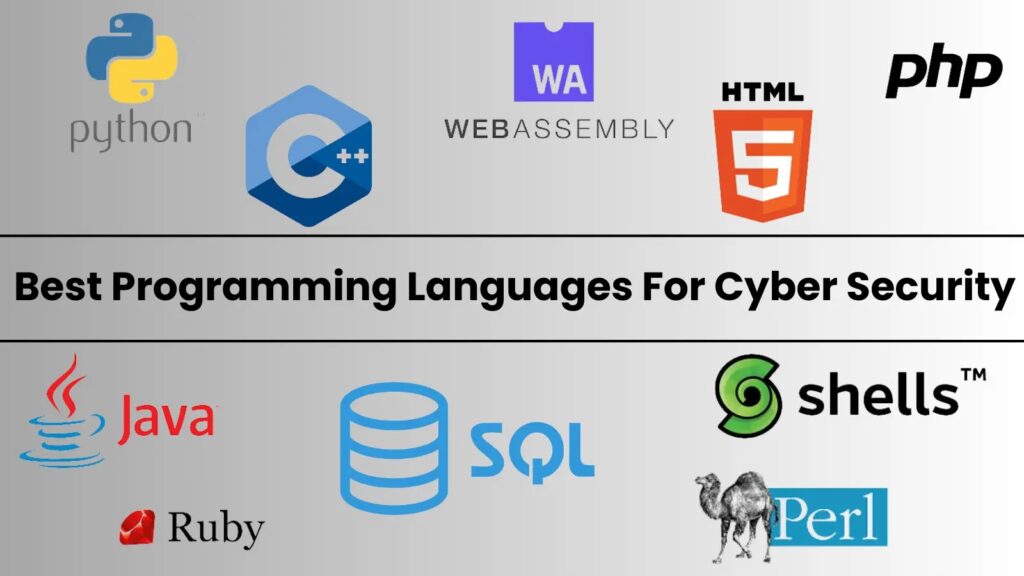
As we approach 2025, certain programming languages are proving indispensable in the cybersecurity field. Whether you’re automating tasks, analyzing threats, or securing networks, mastering these programming languages for cybersecurity can enhance your effectiveness and career prospects.
1. Python:
- Why Learn Python? Python remains the best programming language for cybersecurity in 2025 due to its simplicity, flexibility, and extensive library support. It is widely used for automation, penetration testing, malware analysis, and developing security tools.
- Applications in Cybersecurity
- Writing scripts to automate vulnerability scanning.
- Creating custom tools for penetration testing (e.g., Nmap extensions).
- Analyzing malware behavior with libraries like Scapy.
- Cyber Security Coding Example
python
Copy code
from scapy.all import *
def scan_network(ip_range):
arp_request = Ether(dst=”ff:ff:ff:ff:ff:ff”) / ARP(pdst=ip_range)
answered_list = srp(arp_request, timeout=2, verbose=False)[0]
for _, received in answered_list:
print(f”IP: {received.psrc}, MAC: {received.hwsrc}”)
scan_network(“192.168.1.0/24”)
- Who Should Learn It? Python is ideal for beginners and advanced professionals looking to automate tasks or delve into penetration testing.
SEE ALSO: How Long Does It Take to Learn Cybersecurity?
2. JavaScript:
- Why Learn JavaScript? As the backbone of web development, JavaScript is crucial for understanding and mitigating web-based attacks like cross-site scripting (XSS) and cross-site request forgery (CSRF).
- Applications in Cybersecurity
- Detecting vulnerabilities in web applications.
- Analyzing and crafting browser-based attacks.
- Securing front-end and back-end systems via Node.js.
- Cyber Security Coding Example
javascript
Copy code
let maliciousCode = “<script>alert(‘Hacked!’);</script>”;
document.getElementById(“commentSection”).innerHTML = maliciousCode;
- Who Should Learn It? Web application security analysts and intrusion analysts benefit greatly from JavaScript proficiency.
3. SQL:
- Why Learn SQL? SQL, the standard language for interacting with databases, is vital for preventing and understanding SQL injection attacks.
- Applications in Cybersecurity
- Securing databases from unauthorized access.
- Conducting forensic analysis on compromised database systems.
- Cyber Security Coding Example
sql
Copy code
SELECT username FROM users WHERE username=’admin’ AND password=’secure_password’;
- Who Should Learn It? Database administrators and analysts focusing on securing enterprise databases should prioritize SQL.
4. C and C++:
- Why Learn C and C++? These languages are essential for understanding system vulnerabilities, reverse engineering, and developing exploits.
- Applications in Cybersecurity
- Crafting secure system software.
- Analyzing malware and debugging system vulnerabilities.
- Cyber Security Coding Example
c
Copy code
#include <stdio.h>
int main() {
char buffer[10];
printf(“Enter text: “);
gets(buffer); // Vulnerable to buffer overflow attack
printf(“You entered: %s\n”, buffer);
return 0;}
- Who Should Learn It? Malware analysts and secure systems developers will find these languages indispensable.
5. Bash and PowerShell:
- Why Learn Bash and PowerShell? These scripting languages are crucial for automating repetitive tasks and managing configurations in Linux and Windows environments.
- Applications in Cybersecurity
- Automating security tasks like log parsing.
- Locking down system configurations during incident response.
- Cyber Security Coding Example
bash
Copy code
#!/bin/bash
echo “Checking system updates…”
sudo apt update && sudo apt upgrade -y
echo “System secured.”
- Who Should Learn It? System administrators and incident responders benefit greatly from scripting knowledge.
These languages collectively represent the best programming languages for cybersecurity in 2025, equipping professionals to tackle a wide range of security challenges.
Other Programming Languages for Cyber Security
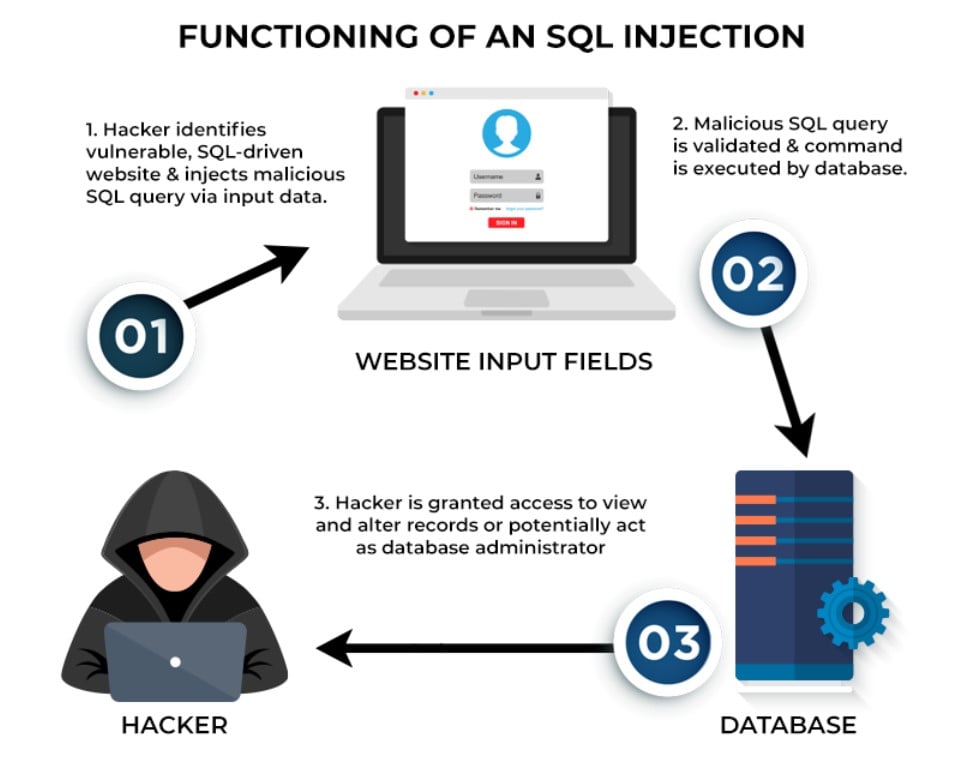
Beyond the core languages discussed earlier, several other programming languages for cybersecurity play specialized roles in securing systems, analyzing vulnerabilities, and developing tools. These languages cater to specific tasks and are valuable for professionals looking to expand their skill set.
1. Java:
- Why Learn Java? Java’s portability and robust security features make it a popular choice for developing secure enterprise applications and mobile platforms.
- Applications in Cybersecurity
- Building secure server-side applications for enterprises.
- Securing Java-based systems in industries like finance and telecommunications.
- Cyber Security Coding Example
java
Copy code
public class SecureLogin {
public static void main(String[] args) {
System.out.println(“Implement secure login logic here…”);
}
}
- Who Should Learn It? Professionals involved in enterprise-level cybersecurity and Android application security.
2. PHP:
- Why Learn PHP? PHP powers over 80% of websites, making it crucial for identifying and mitigating server-side vulnerabilities in web applications.
- Applications in Cybersecurity
- Identifying flaws in PHP-based content management systems (e.g., WordPress).
- Writing secure code to prevent attacks like Remote Code Execution (RCE).
- Cyber Security Coding Example
php
Copy code
<?php
if(isset($_POST[‘username’])){
echo “Sanitize user input to prevent injection attacks.”;
}
?>
- Who Should Learn It? Web security professionals and penetration testers focusing on server-side vulnerabilities.
3. Assembly:
- Why Learn Assembly? As a low-level programming language, Assembly offers insights into how malware operates at the hardware level, making it vital for reverse engineering and vulnerability analysis.
- Applications in Cybersecurity
- Understanding and modifying malicious code.
- Disassembling compiled code to study exploits.
- Cyber Security Coding Example
assembly
Copy code
section .data
msg db “Hello, Assembly!”, 0
section .text
global _start
_start:
; Print message
mov eax, 4
mov ebx, 1
mov ecx, msg
int 0x80
; Exit program
mov eax, 1
int 0x80
- Who Should Learn It? Malware analysts and reverse engineers who require deep system-level understanding.
MORE: Cybersecurity Salary: A Comprehensive Guide
4. Ruby:
- Why Learn Ruby? Ruby is favored in penetration testing frameworks like Metasploit due to its simplicity and efficiency in scripting security tools.
- Applications in Cybersecurity
- Automating security workflows.
- Crafting custom penetration testing scripts.
- Cyber Security Coding Example
ruby
Copy code
puts “Automate a simple security check using Ruby.”
- Who Should Learn It? Penetration testers and security engineers involved in tool development.
How to Decide What Coding Language to Learn for Cyber Security
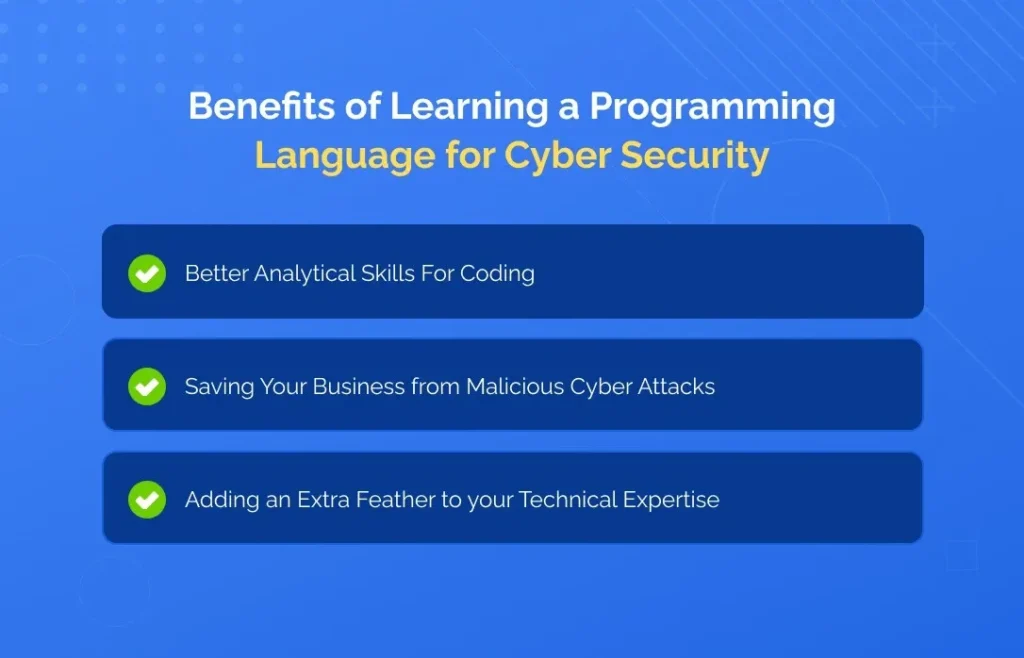
Choosing the right coding language for cybersecurity depends on your career goals, current skill level, and the industry you wish to specialize in. Here’s a step-by-step guide to help you make an informed decision:
Step 1: Identify Your Career Goals
Your choice of programming language should align with the specific roles or domains in cybersecurity you’re targeting:
- Penetration Testing: Python, C, and Bash are excellent choices for scripting exploits, automating tests, and analyzing vulnerabilities.
- Web Application Security: Learn JavaScript, PHP, and SQL to secure front-end and back-end systems and prevent web-based attacks.
- Malware Analysis: Assembly and C/C++ are crucial for reverse engineering and understanding malware at the system level.
- Database Security: SQL is indispensable for securing databases and analyzing injection attacks.
Step 2: Assess Your Current Skill Level
- For Beginners: Start with Python. Its simplicity and readability make it the best programming language for cybersecurity if you’re new to coding. Progress to SQL or JavaScript for broader applicability.
- For Intermediate Learners: Explore languages like C, C++, and PHP to deepen your understanding of system-level vulnerabilities and server-side security.
- For Advanced Professionals: Focus on Assembly for malware analysis and Ruby for developing custom tools.
Step 3: Consider Industry Trends
The best programming languages for cybersecurity in 2025 reflect industry demand:
- Python continues to dominate as the go-to language for automation and scripting.
- JavaScript and SQL remain critical for web and database security.
- Bash and PowerShell are increasingly valued for automating operational tasks in Linux and Windows environments.
Step 4: Combine Languages for Maximum Impact
Mastering multiple languages allows you to tackle diverse cybersecurity challenges. For example:
- Pair Python with SQL to analyze database security.
- Combine JavaScript with PHP for full-stack web security.
- Add Assembly to your skill set for in-depth malware analysis.
Step 5: Leverage Learning Resources
Explore tutorials, bootcamps, and certifications tailored to your chosen languages:
- Free resources: Codecademy, W3Schools, and LearnPython.org.
- Certifications: CompTIA Security+, CEH, and CISSP.
- Hands-on tools: Practice using languages in real-world scenarios via labs and virtual machines.
Cyber Security Coding Salary and Career Impact
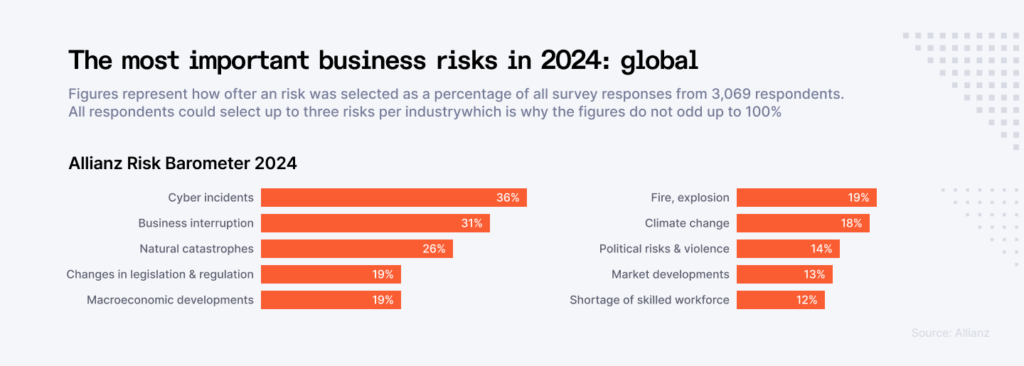
Coding skills not only enhance your effectiveness as a cybersecurity professional but also have a significant impact on your earning potential. As organizations prioritize protecting digital assets, those with expertise in programming languages for cybersecurity are commanding competitive salaries.
The Value of Coding Skills in Cybersecurity
- Employability: Professionals with coding expertise stand out in the job market, as they can perform advanced tasks like scripting, automation, and vulnerability analysis.
- Adaptability: Coding knowledge allows you to work across multiple cybersecurity domains, making you a versatile asset to employers.
Cyber Security Coding Salary by Role
Here’s how coding influences salaries across popular cybersecurity roles:
- Penetration Tester
- Average Salary: $100,000 – $130,000/year (U.S.)
- Coding Languages Required: Python, C, Bash.
- Key Skills: Writing custom exploits, automating security scans, and analyzing vulnerabilities.
- Malware Analyst
- Average Salary: $90,000 – $120,000/year.
- Coding Languages Required: Assembly, C/C++.
- Key Skills: Reverse engineering malware, creating detection signatures.
- Web Application Security Analyst
- Average Salary: $85,000 – $115,000/year.
- Coding Languages Required: JavaScript, PHP, SQL.
- Key Skills: Securing web applications, preventing cross-site scripting (XSS) and SQL injection attacks.
- Database Security Analyst
- Average Salary: $80,000 – $110,000/year.
- Coding Languages Required: SQL.
- Key Skills: Securing relational databases, analyzing database vulnerabilities.
- Security Automation Engineer
- Average Salary: $95,000 – $125,000/year.
- Coding Languages Required: Python, PowerShell, Bash.
- Key Skills: Automating incident response, managing system configurations.
ALSO READ: Is Cybersecurity Hard to Learn? A Complete Analysis
How Coding Increases Salary Potential
- Specialization: Mastery of niche programming languages like Assembly or Ruby can lead to higher pay, as these skills are rare and in-demand.
- Certifications: Combining coding expertise with certifications like CEH (Certified Ethical Hacker) or CISSP (Certified Information Systems Security Professional) boosts your earning potential.
- Experience Level: Experienced professionals who can create custom tools or scripts command higher salaries than those relying solely on off-the-shelf solutions.
Cyber Security Coding Salary by Region
Salaries vary based on geography and demand:
- United States: Coding expertise can lead to salaries exceeding $130,000/year for senior roles.
- United Kingdom: Average salaries for coding-enabled cybersecurity roles range from £50,000 to £80,000/year.
- Global Demand: Coding professionals are in demand worldwide, with competitive pay in Canada, Australia, and Europe.
Cyber Security Coding Examples and Use Cases
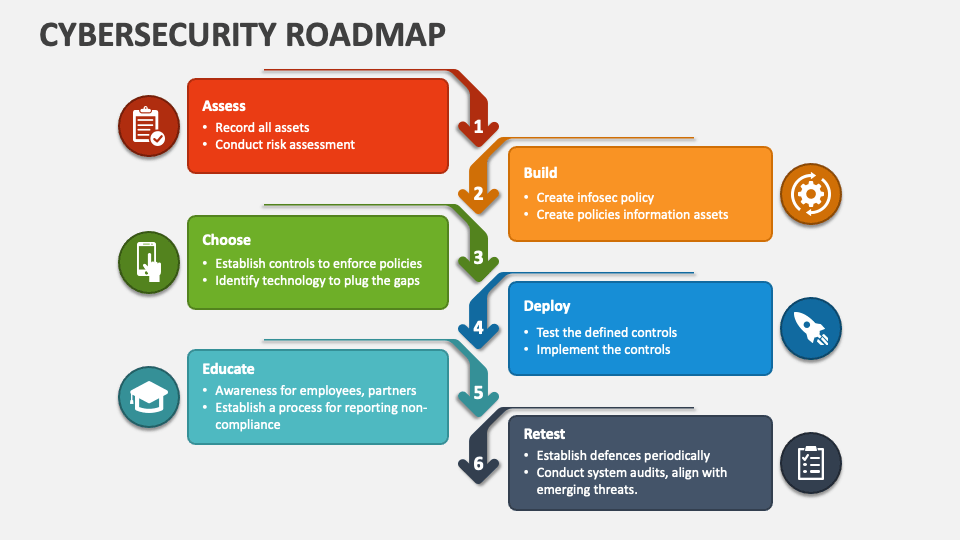
Coding is a powerful tool in cybersecurity, enabling professionals to automate tasks, analyze vulnerabilities, and secure systems effectively. Let’s dive into real-world cybersecurity coding examples and how they’re applied in practice.
1. Automating Network Scanning with Python
- Use Case: Identifying devices and vulnerabilities in a network.
- Code Example:
python
Copy code
from scapy.all import ARP, Ether, srp
def scan_network(ip_range):
arp_request = Ether(dst=”ff:ff:ff:ff:ff:ff”) / ARP(pdst=ip_range)
answered, _ = srp(arp_request, timeout=2, verbose=False)
for send, receive in answered:
print(f”IP: {receive.psrc}, MAC: {receive.hwsrc}”)
scan_network(“192.168.1.0/24”)
- Impact: Saves time by automating the discovery of network-connected devices.
2. Securing Databases with SQL
- Use Case: Detecting and preventing SQL injection attacks.
- Code Example:
sql
Copy code
SELECT * FROM users WHERE username = ? AND password = ?;
- Impact: This parameterized query prevents malicious input from altering the SQL command, a common vulnerability in unsecured systems.
3. Web Security with JavaScript
- Use Case: Identifying cross-site scripting (XSS) vulnerabilities.
- Code Example:
javascript
Copy code
let userInput = “<script>alert(‘Hacked!’);</script>”;
document.getElementById(“commentBox”).innerHTML = userInput;
- Impact: Understanding how XSS attacks work helps cybersecurity professionals secure web applications against similar threats.
4. Automating Incident Response with PowerShell
- Use Case: Checking and enabling a firewall on Windows systems.
- Code Example:
powershell
Copy code
# Check firewall status
Get-NetFirewallProfile | Select-Object Name, Enabled
# Enable firewall if disabled
Set-NetFirewallProfile -Profile Domain,Public,Private -Enabled True
- Impact: Speeds up system hardening during incident response, minimizing potential damage.
5. Reverse Engineering Malware with Assembly
- Use Case: Understanding how malicious software operates.
- Code Example:
assembly
Copy code
section .data
message db “Malware detected”, 0
section .text
global _start
_start:
mov eax, 4 ; syscall: write
mov ebx, 1 ; file descriptor: stdout
mov ecx, message ; message address
mov edx, 16 ; message length
int 0x80 ; execute syscall
mov eax, 1 ; syscall: exit
xor ebx, ebx ; exit code 0
int 0x80
- Impact: Helps security professionals understand and neutralize malware by analyzing its code.
SEE MORE: Can You Learn Cybersecurity on Your Own
6. Web Application Testing with Ruby
- Use Case: Automating penetration testing tasks.
- Code Example:
ruby
Copy code
require ‘net/http’
def check_https(url)
uri = URI.parse(url)
response = Net::HTTP.get_response(uri)
if response.code.to_i == 200 && uri.scheme == ‘https’
puts “The website uses HTTPS. It’s secure.”
else
puts “The website does not use HTTPS. Check security settings.”
end
end
check_https(“https://example.com”)
- Impact: Simplifies security assessments of web applications.
Why Coding Examples Matter in Cybersecurity
- Efficiency: Automates repetitive tasks, allowing professionals to focus on strategic decisions.
- Insight: Provides deeper understanding of vulnerabilities and how to mitigate them.
- Customization: Enables the creation of tools tailored to specific cybersecurity challenges.
These examples showcase how mastering coding skills translates into practical, high-impact solutions.
Best Programming Languages for Cyber Security 2025: A Comprehensive List
To succeed in the rapidly evolving world of cybersecurity, it’s essential to understand which programming languages are most valuable in addressing current and future challenges. This list highlights the best programming languages for cybersecurity in 2025, their applications, and why they are must-haves for any cybersecurity professional.
1. Python: The All-Purpose Language
- Why It’s Essential: Python’s versatility makes it a go-to language for tasks ranging from automation and malware analysis to scripting penetration tests.
- Applications:
- Writing scripts for network scanning and vulnerability assessments.
- Automating repetitive tasks like log parsing.
- Crafting tools for penetration testing.
- Demand in 2025: Python continues to dominate due to its simplicity and extensive library support.
2. JavaScript: The Web Security Language
- Why It’s Essential: JavaScript is integral to securing web applications and mitigating browser-based attacks.
- Applications:
- Preventing cross-site scripting (XSS) and other client-side vulnerabilities.
- Securing both front-end and back-end applications through frameworks like Node.js.
- Demand in 2025: JavaScript remains critical as web-based applications proliferate.
3. SQL: The Database Protector
- Why It’s Essential: SQL is fundamental for securing relational databases, which are frequent targets of cyberattacks.
- Applications:
- Defending against SQL injection attacks.
- Analyzing database vulnerabilities.
- Demand in 2025: As data breaches remain a top concern, SQL will continue to be a vital skill.
4. C and C++: The System-Level Specialists
- Why They’re Essential: These languages provide insights into system vulnerabilities and are critical for exploit development and secure system software.
- Applications:
- Debugging and securing system software.
- Reverse-engineering malware.
- Demand in 2025: Ideal for roles involving embedded systems, IoT security, and malware analysis.
5. Bash and PowerShell: The Automation Experts
- Why They’re Essential: These scripting languages streamline automation and configuration management in Linux and Windows environments.
- Applications:
- Automating system lockdowns and incident response.
- Managing security configurations at scale.
- Demand in 2025: Essential for cybersecurity professionals handling system administration.
6. Assembly: The Reverse Engineering Tool
- Why It’s Essential: Assembly’s low-level access makes it invaluable for understanding malware behavior and system exploits.
- Applications:
- Analyzing malware at the processor level.
- Writing and debugging shellcode.
- Demand in 2025: Crucial for roles like malware analysis and vulnerability research.
7. Java: The Enterprise Security Staple
- Why It’s Essential: Java’s platform independence and security features make it a favorite for enterprise and mobile application development.
- Applications:
- Developing secure enterprise systems.
- Securing Android applications.
- Demand in 2025: Key for professionals working on large-scale systems.
8. Ruby: The Toolmaker’s Friend
- Why It’s Essential: Ruby’s simplicity makes it ideal for developing custom cybersecurity tools.
- Applications:
- Scripting penetration testing frameworks like Metasploit.
- Automating routine security tasks.
- Demand in 2025: Preferred for professionals developing cybersecurity solutions.
9. PHP: The Web Application Guard
- Why It’s Essential: PHP is a dominant language in server-side scripting for web applications.
- Applications:
- Identifying and securing vulnerabilities in PHP-based systems.
- Developing secure server-side code.
- Demand in 2025: Valuable for web security analysts and penetration testers.
READ: Can You Get a Job with Google Cybersecurity Certificate? Find Out How
Choosing the Right Language Combination
To maximize impact, cybersecurity professionals should learn a mix of languages:
- Beginner-Friendly Path: Start with Python and SQL for their simplicity and wide applicability.
- Intermediate to Advanced Path: Add JavaScript, C/C++, and Bash/PowerShell to handle diverse cybersecurity challenges.
- Specialist Path: Focus on Assembly, Ruby, and PHP for niche roles like malware analysis and web security.
Hands-On Platforms for Cybersecurity Learning
- Hack The Box: Practice penetration testing and scripting in real-world scenarios.
- TryHackMe: Offers guided cybersecurity labs that incorporate programming challenges.
- Cybersecurity Bootcamps: Programs like Simplilearn’s Cybersecurity Expert course or Cybrary’s bootcamps provide immersive, hands-on training.
Certifications to Boost Your Profile
Certifications validate your skills and increase your career prospects:
- CompTIA Security+: Entry-level certification covering cybersecurity fundamentals.
- Certified Ethical Hacker (CEH): Focuses on penetration testing and coding.
- CISSP: Advanced certification for cybersecurity professionals.
- Python Institute Certifications: Validate your Python expertise with industry-recognized credentials.
Conclusion
Coding has become a cornerstone skill in the cybersecurity field, empowering professionals to automate tasks, analyze threats, and create tailored security solutions. As cyber threats increase, mastering the best programming languages for cybersecurity in 2025 ensures that you remain relevant and effective in combating these challenges.
Whether you’re starting with Python for its versatility, delving into SQL to secure databases, or exploring Assembly for advanced malware analysis, the right language will depend on your career goals and area of specialization.
Combining multiple languages, such as Python for scripting and JavaScript for web security, can significantly enhance your ability to address diverse cybersecurity scenarios.
Furthermore, coding skills not only increase your employability but also open doors to high-paying roles. By using the resources and learning pathways outlined in this article, you can confidently embark on your journey to mastering the programming languages that align with your aspirations.
Cybersecurity is a dynamic and challenging field, but with the right coding expertise, you can make a lasting impact.
FAQ
What programming language is needed for cyber security?
The programming languages needed for cybersecurity depend on the specific role or task. Here are some of the most critical languages:
Python: Versatile and widely used for scripting, automation, penetration testing, and malware analysis.
JavaScript: Essential for web application security to address vulnerabilities like cross-site scripting (XSS).
SQL: Critical for securing databases and defending against SQL injection attacks.
C and C++: Useful for system-level tasks such as reverse engineering, exploit development, and secure software design.
Bash and PowerShell: Key for automating tasks and managing system configurations in Linux and Windows environments.
Assembly: Necessary for reverse engineering and malware analysis.
Is Python or C++ better for cyber security?
Python is generally better for most cybersecurity roles due to its simplicity, readability, and extensive library support. It’s ideal for beginners and widely used for tasks like automation, scripting, and vulnerability analysis.
C++ is more suitable for advanced tasks like exploit development, reverse engineering, and analyzing system-level vulnerabilities. It requires a steeper learning curve and is used by professionals working closer to hardware or embedded systems.
Do I need to learn coding for cyber security?
Not all cybersecurity roles require coding, but having coding skills significantly enhances your career prospects. Here’s a breakdown:
Mandatory for roles like: Penetration testers, malware analysts, and security engineers, where scripting and tool development are critical.
Optional for roles like: Compliance analysts or risk managers, where coding is less relevant, but understanding code can still be an advantage. Even if not mandatory, coding enables automation, problem-solving, and a deeper understanding of security tools and vulnerabilities.
What is the first programming language to learn for cyber security?
The best first programming language to learn for cybersecurity is Python. Its simplicity, versatility, and relevance across multiple cybersecurity domains make it ideal for beginners. Python can be used for:
– Automating repetitive tasks.
– Writing penetration testing scripts.
Analyzing malware. Once comfortable with Python, you can expand to other languages like SQL, JavaScript, and C++ based on your career goals.
Transform your career with ExcelMindCyber’s roadmap to six-figure success in cybersecurity. Our program delivers essential guidance and strategies to help you master the skills and secure the roles that matter. Start today and take the first step towards transforming your career!
